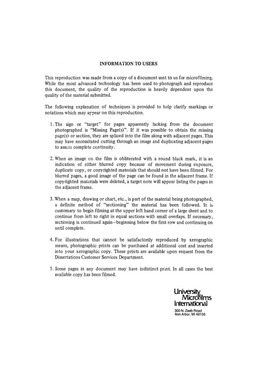| dc.contributor.author | Lovett, Perry Glenn, | en_US |
| dc.date.accessioned | 2013-08-16T12:28:50Z | |
| dc.date.available | 2013-08-16T12:28:50Z | |
| dc.date.issued | 1982 | en_US |
| dc.identifier.uri | https://hdl.handle.net/11244/5090 | |
| dc.description.abstract | This study provides the first, comprehensive account of the evolution of Western ideas concerning the justification of war. This research establishes a historical basis for the contemporary just war tradition, rather than relying on assertions, legalisms, or esoteric philosophical systems. | en_US |
| dc.description.abstract | Because human beings have fought wars, yet recognized at the same time that wars produce preponderantly negative results, they have tried to tame war. Standards of justification have followed a progressive evolution. Humankind has sought: (1) to reduce the frequency of war; (2) to diminish the severity of war; (3) to build a general and lasting peace; and (4) to achieve justice. As a yardstick of the three other tendencies, justice has been seen as natural and reasonable. The natural law tradition has prevailed--hand-in-hand with common utility. From classical times to the twentieth century, each major characteristic of the just war tradition has undergone a slow and uneven, but purposeful, evolution. | en_US |
| dc.format.extent | ix, 500 leaves ; | en_US |
| dc.subject | Political Science, International Law and Relations. | en_US |
| dc.title | Justifying war : | en_US |
| dc.type | Thesis | en_US |
| dc.thesis.degree | Ph.D. | en_US |
| dc.thesis.degreeDiscipline | Department of Political Science | en_US |
| dc.note | Source: Dissertation Abstracts International, Volume: 43-11, Section: A, page: 3700. | en_US |
| ou.identifier | (UMI)AAI8306744 | en_US |
| ou.group | College of Arts and Sciences::Department of Political Science | |
